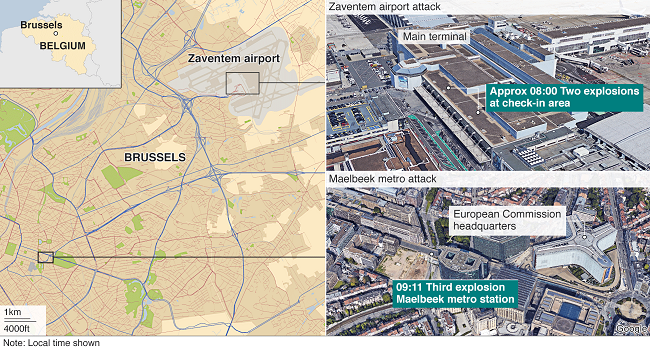The city of Brussels was shaken by terrorist strikes in the morning of March 22, 2016. Twin blasts within seconds of each other hit Zaventem Airport at around 0750hrs local time (GMT) on March 22, 2016. These were triggered by suicide bombers. About an hour later, another terror attack struck Maelbeek subway station in the heart of the town. In both these incidents, 31 persons including 2 suicide bombers were killed and over 330 injured (CNN Report). These attacks took place at the tail end of the morning rush hour and struck the heart of the European officialdom where NATO headquarters is based along with the European Commission and European Union Parliament.
These attacks were apparently in retaliatory in nature as they came just four days after the arrest of the only remaining Paris attacker co-conspirator and ISIS logistician Salah Abdeslam in a police raid and shooting on Friday (March 18) in Molenbeek area of Brussels. Abdeslam was arrested after nearly four months of international manhunt involving joint anti-terror operation conducted by Belgian and French federal agencies in the Molenbeek area of Brussels. This area, densely populated by Muslim migrants from Syria (Chrisafis, 2016), is regarded as hotbed of the Islamic radicals, infamous for its potential of being a fertile ground of radical fighters

Courtesy – British Broadcasting Corporation available at - http://news.bbcimg.co.uk/news/special/2016/newsspec_13942/img/brussels_attacks_1952_%28976x2%29.png?cachebust=123456789
In his first reaction, Belgian Prime Minister Charles Michae admitted, “What we feared has happened” (BBC Europe, 2016), indicating that the police and security agencies had expected some retaliatory action but could not prevent it. Federal analysts confirmed that the first twin blasts at the airport were stronger in ballistic capability and some nails were also recovered from the blast site indicating the use of locally assembled IEDs. The federal prosecutor confirmed that the attacks bore the hallmark modus operandi of the IS whose blue print could be traced in the Paris terror attack where several perpetrators wore explosive belts (Diehl, 2016). They further affirmed that these attacks may have been retaliatory in response of arrest of Salah Abdleslam from the same neighbourhood as Abdelhamid Abaaoud who had led the IS attack group in Paris.
The perpetrators:
Belgian security authorities quickly identified as perpetrators of the suicide attack as two brothers Khalid el-Bakraoui (27) who blew himself up at the Maelbeek metro station and Ibrahim el-Bakraoui (30) who carried out suicide bombing at the airport. A third suspect has been named as Najim Laachraoui (25) who had made the bombs for the Paris attack and who is still at large. All the three are confirmed as Belgian national and had earlier come to adverse notice for criminal activities but not for links with terrorist activities. Subsequently, a massive manhunt and search operation was launched in the sensitive parts of the city.
Why Brussels?
While the immediate temptation for choosing Brussels as the target for the retaliatory attacks was the arrest of Abdeslam last week, the city, analysts point out, even otherwise presents an attractive target being an important European capital representing core western interest, easily accessible and well connected with the rest of Europe and above all, being the seat of the European Union government and headquarter of NATO. In recent times, it had also emerged as an important location for counter terrorism investigators in the course of Paris attack investigations. Federal investigating agencies of the Belgium and France were aggressively tracking down IS recruitment process and IS activists in and around Brussels. IS was known for eying Belgium since long as it was one of the first countries to join the US led military coalition against Islamic State and had carried out airstrikes in Iraq, assisted US forces in training and advising the Iraqi forces. It ws also home to many Muslim migrants on account of its liberal immigration policy.
The Maelbeek area of Bussels came in lime light when two candidates Lhouncing Ait Jedding and Redouane Ahrouch belonging to Fledgling Islam Party, won with heavy majority from the predominantly Muslim inhabited municipalities of Molenbeek-Saint-Jean and Anderlecht. In their post-election press conference these elected councilors had said that they regarded their election as a key to the assertion of Muslim community in Belgium and vowed to implement Islamic Sharia law in Belgium. Most of the Muslims in Brussels are of Moroccan (70%) and Turkish (20%) origin with the remainder 10% coming from Albania, Egypt, Pakistan and North Africa. They began arriving in Belgium in the 1960s as guest workers. Although the guest-worker program was terminated in 1974, many immigrants stayed back by using family-reunification laws and brought over their families. Molenbeek area with an estimated 25% Muslim population has in recent years, posed growing insecurity to the multinational companies, forcing them to leave that municipal area. In June 2011, for example, the American advertising agency BBDO abandoned Molenbeek after citing over 150 instances of assaults on its staff by local youth (Kern, 2012).
Bernard Squarcini, a former head of France’s internal intelligence (Nossiter, 2016) and the security community consider Belgium’s 11.2 million people, who are facing widening derision of being the world’s wealthiest failed state - a worrying mix of deeply rooted terrorist networks; a government weakened by divisions among French, Dutch and German speakers and an overwhelmed intelligence service which is seemingly in chronic disarray, providing “a favorable ecosystem: an Islamist milieu, and a family milieu”. In tune with Squarcini’s views, some security and intelligence expert consider the Brussels blasts as proof that Europe’s open societies, even under states of emergency, will never be risk free; however, the risks are fatally compounded. It is also considered as wide failures of Intelligence agencies to share the information and highlight the weakness of the Belgian intelligence service that lacked the capacity to pick up the weak signal from the emerging plots and networks. The Brussels blasts of Tuesday marks a dangerous development which can be considered as an audacious message to the International community as well underscoring the capabilities of the perpetrators who can attack on any target at any time by their wish. Security experts the world over are unanimously of the view that excessive dependence on electronic and technical intelligence would not suffice in dealing effectively with the growing menace of terrorism of this variety. They recommend greater emphasis on ‘humint’ through deep penetration human assets couple with very close coordination between concerned regional intelligence apparatus on terror related issues.
International condemnation:
Internationally, the Brussels attacks were strongly condemned by Heads of states and governments affirming their solidarity with the Belgian government. US President Barak Obama, in Havana, prefaced a speech to the Cuban people by condemning “these outrageous attacks against innocent people (Shannon, 2016).” The British Prime Minister in his reaction said, “The countries of Europe need to stand together against terror”. Following the attacks in Brussels, UK police stepped up patrols at key sites in sensitive areas. After meeting with its British government’s Cobra Committee, PM Cameron further said, “We face a very real terrorist threat right across the different countries of Europe and we have to meet that with everything we have”. Australian Prime Minister, Malcolm Turnbull tweeted Australians’ solidarity with the people of Belgium following the attacks and said, “Deeply concerned by the attacks in Brussels. Australians’ thoughts, prayers and solidarity are with the people of Belgium,” (Dodd & Asthana, 2016). Chinese Foreign Ministry Spokesperson Hua Chunying said, “China strongly condemned the attacks on Brussels and firmly opposes terrorism in all forms and offered deep condolences to the families of the victims. The Chinese people stand with the Belgians and the Europeans” Germen Chancellor Angela Merkel also strongly condemned the attacks and referred the attackers as “Enemy of the European Values” and assured all help from German security agencies to Belgian security services to find, identify and punish the perpetrators of Brussels Attack (Nasr, 2016).
India’s Reaction/Concerns:
India’s immediate concern was PM Modi’s scheduled visit to Brussels on March 30, for the 13th India-EU Summit. From Brussels, Mr. Modi is to further proceed to the US to attend Nuclear Security Summit on March 31. In New Delhi, Ministry of External Affairs has confirmed that there was no change ‘till now’ in PM Modi’s programme (Swaroop, 2016). The Belgian government also has not called off the meeting. Any different reaction/response in this regard would have only strengthened the moral of the perpetrators. However, intelligence and security agencies of India would expect necessary proactive measures in this regard to ensure foolproof security arrangements. According to the Indian Ambassador in Brussels, this was being assured by the local authorities.
In India, as an immediate response, all round security alert has been sounded with special focus on airport security and in sensitive areas. It was pointed out that absence of pre-entry scanning and security checks was a contributing factor as the authorities there had possibly not reacted to several warnings of terrorist attacks in countries like France, Britain and Spain. Especially after the Paris siege and shootout, investigations had revealed that many terrorist modules were based in Belgium. These should have encouraged the authorities to enforce pre-entry checks at the airport. Indian security experts point out that similar situation used to obtain in India decades back. But things have since changed with the Director General Civil Aviation Security and Central Industrial Security Force not allowing any procedure that could pose such threats at air ports.
Of greater relevance in the Indian context is the growing presence of Da’esh/ISIS supporters and sympathizers in certain parts of the country. Such highly radicalized sympathizers of this terror group need to be monitored and acted against with firmness. Indian security/intelligence community can not possible draw comfort from the fact that the number of individuals arrested or under monitoring has not been large. The radicalization of this extreme nature is slowly spreading in the region including Pakistan and Bangladesh though authorities in both these countries remain in denial. As mentioned earlier in the context of the European countries, even in the sub-continental scenario, it is vitally important that the intelligence and security establishments in India, Pakistan and Bangladesh recognize the need for serious inter services engagement to jointly develop an effective mechanism for intelligence gathering and timely sharing thereof.
In the Indian context, one more issue that needs to be highlighted is the legal and constitutional constraints emanating from our federal structure under which law and order and local policing are state subjects under our constitution. This, technically, results in a situation that the central government collects intelligence but can only share it with the state authorities for operationlising the inputs. Regrettably, at times, the state authorities still do not grant this issue all the seriousness that it deserves. Even though some improvement is noticeable in recent times, experts believe that much more needs to be done by the state intelligence units to focus on terrorism as a matter grave concern. These concerns have been shared on a regular basis by the Intelligence Bureau with the state Directors General of Police and their intelligence chiefs. These were also recently raised by the Defense Minister after his recent visit to the airbase in Bareilly, UP where some observations were brought to his notice pertaining to the security of the airbase (Parrikar, 2016). Paris attack of last year, the Brussels bombings and indeed our own Pathankot incident early this year are timely reminders of the need to act and act decisively to deal with terror.
Works Cited
- BBC Europe. (2016, March 22). Brussels explosions: What we know about airport and metro attacks. Retrieved March 23, 2016, from http://www.bbc.com: http://www.bbc.com/news/world-europe-35869985
- Chrisafis, A. (2016, March 18). Paris attacks suspect Salah Abdeslam shot and arrested in Brussels. The Guardian. Retrieved March 22, 2016, from http://www.theguardian.com/world/2016/mar/18/paris-attacks-suspect-salah-abdeslam-wounded-in-brussels-terror-raid-reports
- Diehl, J. (2016, March 22). Terror in Brussels: A Wounded City Searches for Answers. Spiegel online international. Retrieved March 23, 2016, from http://www.spiegel.de/international/europe/brussels-investigators-seek-clues-and-accomplices-a-1083696.html
- Dodd, V., & Asthana, A. (2016, March 22). Belgium attacks: France deploys extra police as UK steps up patrols. The Guardian. Retrieved March 23, 2016, from http://www.theguardian.com/world/2016/mar/22/uk-police-increase-presence-at-key-locations-after-brussels-blasts
- Kern, S. (2012, November 09). Belgium Will Become an Islamic State. Retrieved March 22, 2016, from GATESTONE Institute: http://www.gatestoneinstitute.org/3442/belgium-islamic-state
- Nasr, J. (2016, March 22). Merkel says Germany to help Belgium capture Brussels attackers. (P. Carrel, Ed.) Reuters. Retrieved March 23, 2016, from www.reuters.com/article/us-belgium-blasts-germany-merkel-idUSKCN0WO2GU
- Nossiter, A. (2016, March 22). Brussels Attacks Underscore Vulnerability of an Open European Society. The New York Times. Retrieved March 23, 2016, from http://www.nytimes.com/2016/03/23/world/europe/belgium-security.html
- Parrikar, M. (2016, February 07). No interference from PMO, no delays in arms deals: Defence Minister Manohar Parrikar in Aap Ki Adalat. Retrieved March 23, 2016, from India TV news: http://www.indiatvnews.com/news/india/manohar-parrikar-aap-ki-adalat-no-interference-from-pmo-57455.html
- Shannon, V. (2016, March 22). Brussels Attacks: What We Know and Don’t Know. The New York Times. Retrieved March 23, 2016, from http://www.nytimes.com/2016/03/23/world/europe/brussels-attacks-what-we-know-and-dont-know.html?_r=0
- Swaroop, V. (2016, March 22). PM Modi condoles deaths in Brussels attack; To visit Brussels for India-EU summit. Retrieved March 23, 2016, from ddnews: http://www.ddinews.gov.in/Home%20-%20Headlines/Pages/PMtovisitBrussels.aspx
Published Date: 28th March 2016, Image Source: https://www.google.co.in
(Disclaimer: The views and opinions expressed in this article are those of the author and do not necessarily reflect the official policy or position of the Vivekananda International Foundation)










Post new comment